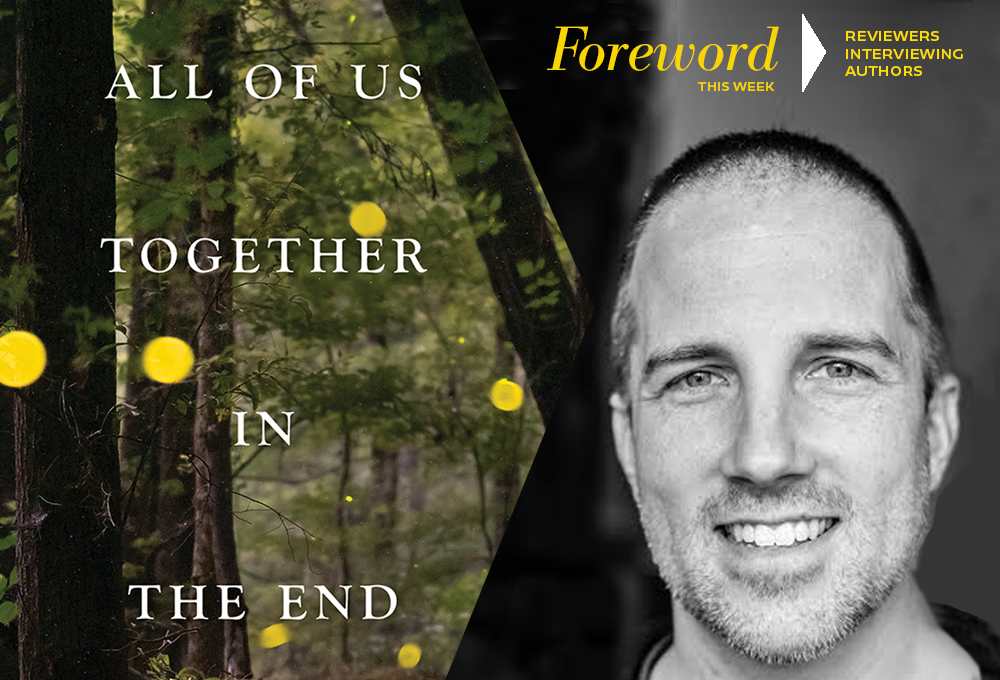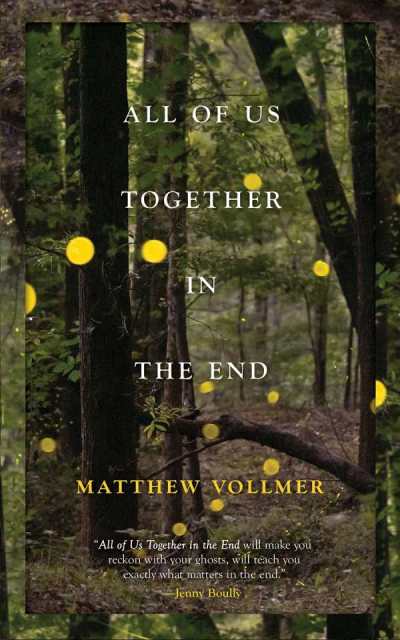Reviewer Rebecca Foster Interviews Matthew Vollmer, Author of All of Us Together in the End

Away with our normal, ever-so-scintillating intros and straight to a challenge: Can you read Matthew Vollmer’s answer to Rebecca Foster’s first question without coming to a profound new realization about words and thought, seeing and feeling? Give it a shot.
Then read Rebecca’s review of Matthew’s All of Us Together in the End. Then buy the book.
We’re outta here.
Your work embraces hybrid forms. How does crossing genres help you to tell the stories that need to be told?

We think with words. And what are words but expressions of thought? With thoughts, therefore, we make the world. And how myriad are the forms that the world makes! And then: how do I speak about the things I see and feel? The apprehension of a tree may suggest discursiveness, a many-branched digression, or it might suggest shade and shadow and obfuscation. The rootedness of the tree might imply groundedness, or its wind-stripped leaves a delightful fragmentation. Depending on the day and hour, or the weather, or the season, or my mood or disposition, I will certainly require different words in my attempt to cast my perception of the tree in the amber of language—and I will also need different forms.
The representation of lived experience, then, will always necessitate a particular shape. Sometimes this representation is rather straightforward; on other, more complicated occasions, a melange of sorts is in order.
The loss of your familial Seventh-day Adventist faith contrasts with the interest in the unexplained that you developed as you investigated the blinking lights. Where did that newfound openness to the supernatural come from?
“Openness” is the exact right word. I feel like, for as long as I can remember, I have longed for—and preferred—openness. But I was made to believe—thanks, in part, to the church in which I was raised—that such a disposition was shameful. I should know things for sure and delight in my certainty!
The Bible was the book, and in it I could find the answer for every question. But the more I began to read and write, the more I confronted the dazzling array of possibilities that human consciousness could take—and with this, the infinite perspectives available—the easier it was to leave the idea of singular conclusions behind.
All of Us Together in the End begins with a quote from Karen Armstrong’s The Case for God, in which she cites the scientist Karl Popper claiming that the most profound utterance a human could make would be to say, “I know nothing.” Knowledge, in my experience, can be tyrannical. It tends to close more doors than open them. And I want my doors—and windows—open, so I can see what’s outside of me and let what’s outside in.
You considered everything from logical explanations to demonic possession. What do these epistemological poles tell us about the limitations of science and religion?
Maybe these poles can be best understood as the difference between the rational and irrational. We need both. We need to be awake and we need to sleep. We need to verify what’s real and we need to imagine. We need facts and we need dreams. Science is the realm of what can be verified. And religion is the realm of imagination—of the kind of phenomena we can’t verify but we can nevertheless think into being. Both have a way of uplifting experience and degrading it. I expect there are no limitations to either.
COVID-19 was a consideration here: the narrative mostly covers 2019 through 2020. Would you have gone about this quest differently were it not for the pandemic?
Yes. During the pandemic, time seemed to slow down. If you were lucky, space opened up and presented you with room for meditation. And I had, as it turned out, a lot to consider: my dead mother, who seemed suddenly more present than she had been in life; my father—liberated from caregiving, but also unmoored from the woman he’d loved for over half a century; the appearance of inexplicable lights; the spread of a mysterious disease and humanity’s reaction to it.
As a teacher who elected to teach his classes asynchronously, and with due dates I always qualified with “on or around,” I seemed to have nothing but time. And, with all that time, and so much on my mind, I was able to indulge in a banquet of possible explanations about the unknown.
How would you characterize your convictions nowadays? Do you believe in ghosts?
My convictions. I can’t see that word without the embedded “convict” and its suggestion of imprisonment. Again, I turn to openness. I am open to everything, ghosts included. Otherwise, I shut myself inside the cell of the known. For some reason, I think about the Time-Life Books series from the 1980s that used to be advertised on TV a lot: Mysteries of the Unknown. I want a world like that, where I can consider the Loch Ness monster, UFOs, phantoms, cryptids, secrets, and myths. I want a world where magic is real but its parameters undefined.
Are the flashing lights an ongoing thing? Will they make it into a future edition of North Carolina Ghost Lights and Legends?
Charles Gritzner said that he might include the lights in a future edition of his book—but who knows? And as to whether the lights appear in the cove by my parents’ house—I don’t know that, either. And likely won’t, unless I happen to visit when my father and his wife aren’t home. When they are, they have this system whereby LEDs are projected onto the trees surrounding the house. I don’t know why they do this. It’s unnerving to wake up in the middle of the night and be greeted not with darkness but with tiny, multicolored dots. Dad says that it keeps the whippoorwills and their infernal midnight whooping away. But it also ensures, maybe, that the blinking lights from before are blotted out by these artificial ones. Which makes me sad, in a way. Someday, perhaps, I’ll live long enough to return to that house and live there again. When I do, I’ll look forward to peering out of windows into the pitch black, and waiting for any signals the world has to shine back at me.
Rebecca Foster
